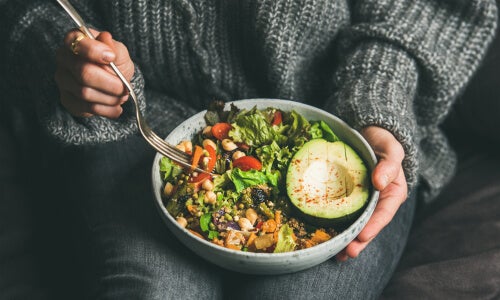Why People Choose the Vegetarian Lifestyle

The vegetarian lifestyle is becoming increasingly popular. In recent years, there has been a boom in the number of people practicing it. While we’re familiar with the term, do you know what it actually means? Read on to find out.
According to the International Vegetarian Union, (IVU), vegetarianism consists of following a diet based on foods derived from vegetables, with different modalities depending on whether the diet includes or excludes dairy products, eggs, and honey.
But what are the beliefs and principles that motivate the decision to make these dietary changes? The IVU states that vegetarianism isn’t just a diet, but also a lifestyle. First, we’ll look at how it originated.

How did vegetarianism start?
The concepts vegetarianism and vegetarian first appeared in the United Kingdom in 1887 with the first vegetarian association in the world, the Vegetarian Society. Until that time, the term “vegetable diet” was used to refer to those who ate exclusively plant-derived foods.
Later on, associations emerged in other countries, such as Germany and the Netherlands, based on the same principles as the Vegetarian Society. Due to the boom, in 1908, the International Vegetarian Union was created, a non-profit organization that aimed to promote vegetarianism.
Currently, this ideology is still growing, as more and more people are deciding to be vegetarian, as a survey by the Vegetarian Resource Group (VRG) in 2006 states, which estimated that 6.7% of the world’s population is vegetarian.
Modalities of vegetarianism
According to the International Vegetarian Union (IVU), there are different modalities that form part of vegetarianism, depending on the type of diet that people choose.
- Ovo-vegetarianism. When people consume eggs with their vegetarian diet.
- Lacto-vegetarianism. When they consume dairy products as part of their diet.
- Ovo-lacto vegetarianism. When people consume both eggs and dairy productos.
- Veganism. When people exclude all foods derived from animals (honey, milk, cheese, and eggs).
Motivating principles
We’re now going to point out some of the motivating principles of the people who decide to join the vegetarian lifestyle.
- Health. They consider that a healthy and organic diet is one that’s based on vegetables. They exclude meat in their menu, as they don’t perceive it to be an essential food.
- Ecological reasons. Some vegetarians say that extensive and intensive livestock farming methods are some of the main causes of our planet’s degradation. They point to data, such as an FAO (Food and Agriculture Organization) study, which states that the livestock sector generates more greenhouse gases than the transport industry. It would, therefore, be one of the main factors in global climate change.
- Religion. Some religions promote the vegetarianism lifestyle. An example of this is the Hindu religion, which states that cows are sacred animals and worthy of veneration. Because of this, they say it shouldn’t be used for human consumption purposes.
- Ethics. Other vegetarians choose to be so for ethical reasons. They defend animal rights, as they consider killing animals for food unethical. They especially point to its abuse and exploitation with the sole purpose of producing products for human consumption (food, objects, clothes, etc.). In addition to this, they defend an animal’s right to a dignified life and death.

What other factors come into play in the vegetarian lifestyle?
To conclude, if we take into account the motivating principles mentioned above, we can see that a vegetarian diet can’t be considered something that’s merely nutrition-based. It’s also clearly an attitude and a lifestyle. It’s possible – and also likely – that a vegetarian will also reject other ways of using animals to produce consumer goods.
Similarly, people who follow a vegetarian lifestyle may not be in favor of certain activities or going to certain places. For example, going to a restaurant where the menu is exclusively carnivorous, going to a bullfighting event, or any other celebration or event where animals are used for entertainment, such as circuses.
All cited sources were thoroughly reviewed by our team to ensure their quality, reliability, currency, and validity. The bibliography of this article was considered reliable and of academic or scientific accuracy.
- Appleby P, Roddam A, Allen N, Key T. Comparative fracture risk in vegetarians and nonvegetarians in EPIC-Oxford. Eur J Clin Nutr. 2007;61:1400-6.
This text is provided for informational purposes only and does not replace consultation with a professional. If in doubt, consult your specialist.








